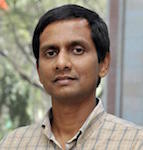Plenary Speakers (more to be added)

Christian Borgs
Microsoft Research
- Title: Graphexes and Multigraphexes: A Deeper Look
- Abstract: In a recent series of papers, it was shown that the completion of the set of sparse graphs under sampling convergence (a notion of left convergence for sparse graphs) is the space of graphexes, where a graphex consists of a graphon over a sigma-finite measure space, a "star density" function from this space into R_+, and real parameter called the dust density. In this talk, I further develop the theory of graphexes, including the definition of an analogue of the cut metric, the question of uniqueness, and an application to sparse configuration models. This work is joint work with J.T. Chayes, H. Cohn, S. Dhara, L.M. Lovasz, and S. Sen.
- Bio: Christian Borgs is Deputy Managing Director and Cofounder of Microsoft Research New England in Cambridge, Massachusetts. Before joining Microsoft in 1997 he was the C4 Chair for Statistical Mechanics at the University of Leipzig. Borgs has authored about 120 research papers and is named as an inventor on a little over 30 patents. His current research concerns the science of networks, including graph theory, graph algorithms, algorithmic game theory and computational biology. He is one of the inventors of the theory of graph limits which is widely used in the learning and estimation of massive networks. He is also known for his earlier work on the mathematical theory of first-order phase transitions and finite-size effects, as well as his work in phase transitions in combinatorial optimization. After his Ph.D. in mathematical physics at the University of Munich, he held a postdoctoral fellowship at the ETH Zurich and after that got his Habilitation in mathematical physics at the Free University in Berlin. Among the honors he has received are the Karl-Scheel Prize of the German Physical Society, and the Heisenberg Fellowship of the German Research Council. Borgs has twice been a member of the Institute for Advanced Study, and is a Fellow of the American Mathematical Society, and the American Association for the Advancement of Science. He serves on several editorial boards and boards of governors, including the board of the Institute for Mathematics and its Applications (IMA), where he is Chair of the board.
- Web page: https://www.microsoft.com/en-us/research/people/borgs/

Jennifer Chayes
Microsoft Research
- Title: Graphons and Graphexes as Limits of Sparse Graphs
- Abstract: Bounded Graphons over a probability space play an important role in the theory of graph limits and modeling of dense graphs. After reviewing the dense theory, as well the extension to sparse graphs using unbounded graphons and convergence in the rescaled cut metric, I discuss a recent alternative theory. This new theory is based on the notion of sampling convergence, which is the appropriate generalization of subgraph convergence to sparse graphs. The natural limit objects in this theory are graphons over sigma-finite measure spaces, and, more generally, their extension to graphexes, which form the completion of the space of sparse graphs under sampling convergence. This is joint work with C. Borgs, H. Cohn, N. Holden and V. Veitch.
- Bio: Jennifer Chayes is Technical Fellow and Managing Director of Microsoft Research New England, NYC, and Montreal. She was for many years Professor of Mathematics at UCLA. She is author of over 140 academic papers and inventor of over 30 patents. Her research areas include phase transitions in computer science, structural and dynamical properties of networks, graph theory, graph algorithms, and computational biology. She is one of the inventors of the field of graphons, which are now widely used in the machine learning of massive networks. Chayes' recent work focuses on machine learning, broadly defined. Chayes holds a BA in physics and biology from Wesleyan, where she graduated first in her class, and a PhD in physics from Princeton. She was a postdoctoral fellow at Harvard and Cornell. She is the recipient of the NSF Postdoc Fellowship, the Sloan Fellowship, the UCLA Distinguished Teaching Award, and the Anita Borg Institute Women of Leadership Vision Award. She has twice been a member of the Institute for Advanced Study in Princeton. Chayes is Fellow of the American Association for the Advancement of Science, the Fields Institute, the Association for Computing Machinery, and the American Mathematical Society, and the American Academy of Arts and Sciences. She is the winner of the 2015 John von Neumann Lecture Award, the highest honor of the Society of Industrial and Applied Mathematics. In 2016, she received an Honorary Doctorate from Leiden University. Chayes serves on numerous scientific boards and committees. She is a past VP of the American Mathematical Society, past Chair of Mathematics for the Association for the Advancement of Science, and past Chair of the Turing Award Selection Committee. She is also committed to diversity in the science and technology, and serves on many boards to increase representation of women and minorities in STEM.
- Web page: https://www.microsoft.com/en-us/research/people/jchayes/

Ravi Kumar
Google Research
- Title: Sequences, Choices, and their Dynamics
- Abstract: Sequences arise in many settings: urls to visit, songs to listen to, videos to watch, restaurants to dine at, and so on. User-generated sequences are tightly related to mechanisms of choice, where a user must select one from a finite set of alternatives. We will discuss a class of problems arising from studying such sequences and the role discrete choice theory plays in these problems. We will present modeling and algorithmic approaches to some of these problems and illustrate them in the context of large-scale data analysis.
- Bio: Ravi Kumar has been a senior staff research scientist at Google since 2012. Prior to this, he was a research staff member at the IBM Almaden Research Center and a principal research scientist at Yahoo! Research. His research interests include Web search and data mining, algorithms for massive data, and the theory of computation.
- Web page: https://sites.google.com/site/ravik53/